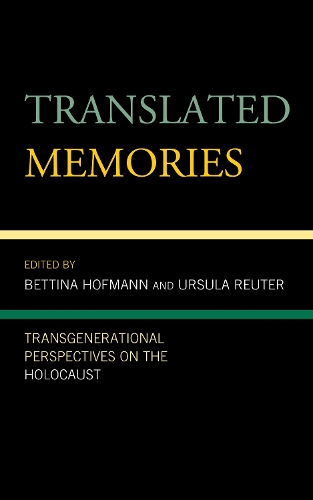
Translated Memories: Transgenerational Perspectives on the Holocaust
(Paperback)
Available Formats
Publishing Details
Translated Memories: Transgenerational Perspectives on the Holocaust
By (Author) Bettina Hofmann
Edited by Ursula Reuter
Contributions by Anne Ranasinghe
Contributions by Bettina Hofmann
Contributions by Ursula Reuter
Contributions by Carol Ascher
Contributions by Daniel Feldman
Contributions by Bruno Arich-Gerz
Contributions by Rebecca Margolis
Contributions by Doron Ben-Atar
Bloomsbury Publishing PLC
Lexington Books
6th May 2022
United States
Classifications
Professional and Scholarly
Non Fiction
History of religion
The Holocaust
Literature: history and criticism
History
940.5318
Physical Properties
Paperback
404
Width 154mm, Height 220mm, Spine 24mm
649g
Description
This volume engages with memory of the Holocaust as expressed in literature, film, and other media. It focuses on the cultural memory of the second and third generations of Holocaust survivors, while also taking into view those who were children during the Nazi period. Language loss, language acquisition, and the multiple needs of translation are recurrent themes for all of the authors discussed. By bringing together authors and scholars (often both) from different generations, countries, and languages, and focusing on transgenerational and translational issues, this book presents multiple perspectives on the subject of Holocaust memory, its impact, and its ongoing worldwide communication.
Reviews
Translated Memories grew out of a conference held in Essen, Germany, in July 2015. As editors Hofmann (Univ. of Wuppertal, Germany) and Reuter (Germania Judaica, Cologne Library on the History of German Jewry) state in the introduction, their interest is in specific cases of Holocaust memory as expressed in different languages and media by members of the second and third generations of Holocaust survivors." Another crucial point of interest for them "is the mode of translation ... [understood] both literally and metaphorically. The resulting 22 essays are groundbreaking in their conceptual diversity, many of them insightful and well researched and enriched by, and sometimes paired with, compelling personal stories by the children and grandchildren of survivors. The existing literature on Holocaust memory is already vast, yet these essays put forth new and invaluable ideas that seek to answer how "later-born authors approach memories transmitted by surviving family members. Of particular note are the five essays in part 4 (Objects and What to Make of Them), which look at the special significance of memories carried by simple objects handed down through generations. Summing Up: Highly recommended. Lower-division undergraduates through faculty.
* Choice *This book is a groundbreaking addition to two emergent fields: the study of the linguistic and cultural translation of Holocaust texts, and the study of intergenerational memory. It is a must-read for scholars in the field. -- Andrea Hammel, co-editor of Translating Holocaust Lives
Author Bio
Bettina Hofmann teaches American studies at the University of Wuppertal. She recently co-edited the volumes Life Writing: Lives in Focus of Praxis English and Performing Ethnicity, Performing Gender: Transcultural Perspectives.
Ursula Reuter is director of Germania Judaica, Kln Library on the History of German Jewry.
